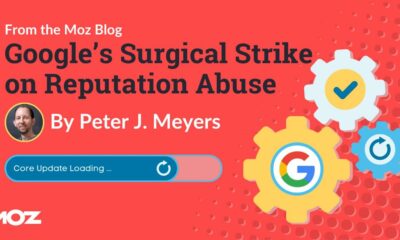SEO
Keywords in Domain Names? How Domains Impact SEO

Domain names used to be a solid ranking factor.
Starting a website on a keyword-focused name meant you could be ranking in top 5 for that keyword in a matter of a few weeks.
It is no longer the case, yet the persistent myths keep lingering in our industry. So let’s start with those: SEO and domain name myths:
1. Domain names are no longer a direct ranking factor, according to Googlers
John Mueller, Webmaster Trends Analyst at Google, has just recently confirmed that again.
In fact, exact-match keyword-focused domain effect was dampened back in 2011 when it became an obviously unfair ranking manipulation. The change in algorithm was slow and gradual which is why many SEOs still have a hard time letting it go.
One fact remains: Keywords in a domain name could generate some external link equity with those keywords as an anchor text.
Surely, the role of keywords in the anchor text is also a ranking factor that is slowly but surely losing power but it is still a very strong one!
With their new smart query processing algorithms, Google is going to rely on keywords less and less, so investing into keyword-driven domains or links is not a viable SEO strategy in the long run.
2. Domain age is not a ranking factor
This is a weird myth that has persisted for no reason: As far as I know, Google never confirmed domain age to impact their algorithm in any way.
In fact, they stated that domain age was not a ranking factor, yet lots of marketers are still trying to buy a second-hand domain because it is supposedly better than a brand new one.
3. No need to register your domain for years ahead
Another persistent SEO advice that has no reason to exist is to register your domain for at least several years ahead for Google to know you are taking it seriously.
Yet, Google said that this wasn’t part of their algorithm.
Domain registration is being considered by Google in other ways. For instance, Googlers have revealed that they do understand domain ownership change and use that as a ranking factor. This somewhat shows that Google may be using domain registration data to identify all sites owned by the same person.
On the other hand, this statement also means that there is little point in buying expired domains for the sake of claiming their rankings or redirecting their backlinks. Google will know those domains have changed ownership and devalue all of its past signals.
Well, it may exist in the SEO industry but not for Google.
I did a detailed piece on why SEOs should stop using domain authority but the gist of it is that Google utilizes backlink signals on a page level, and never on a domain level.
Domains do not aggregate link equity from all pages hosted on that site. We need to quit this myth because it fosters all kinds of ill-informed SEO strategy decisions.
DA is a third-party SEO invention that has nothing to do with the actual Google algorithm.
5. Top-Level domain (.com) is not a ranking factor
Many years ago getting a .com domain name would actually give you some SEO advantage. In fact, for commercial search queries, you’d have been hard-pressed to find any other domains.
This is not the case any more. These days Google doesn’t care about your top-level domain.
On the other hand, Google has confirmed to ignore keywords in TLDs (like .seo, .attorney, .events).
Note: Local domains (e.g. .ca, .com.ua, etc.) are still a solid ranking factor as Google will try to limit these sites to their local Google search results.
Domains are still important
While domain names don’t have a direct SEO impact, choosing a domain that (hopefully) triggers strong niche associations is still essential.
A well-chosen domain name can increase your click-through because it is part of Google’s search snippet:
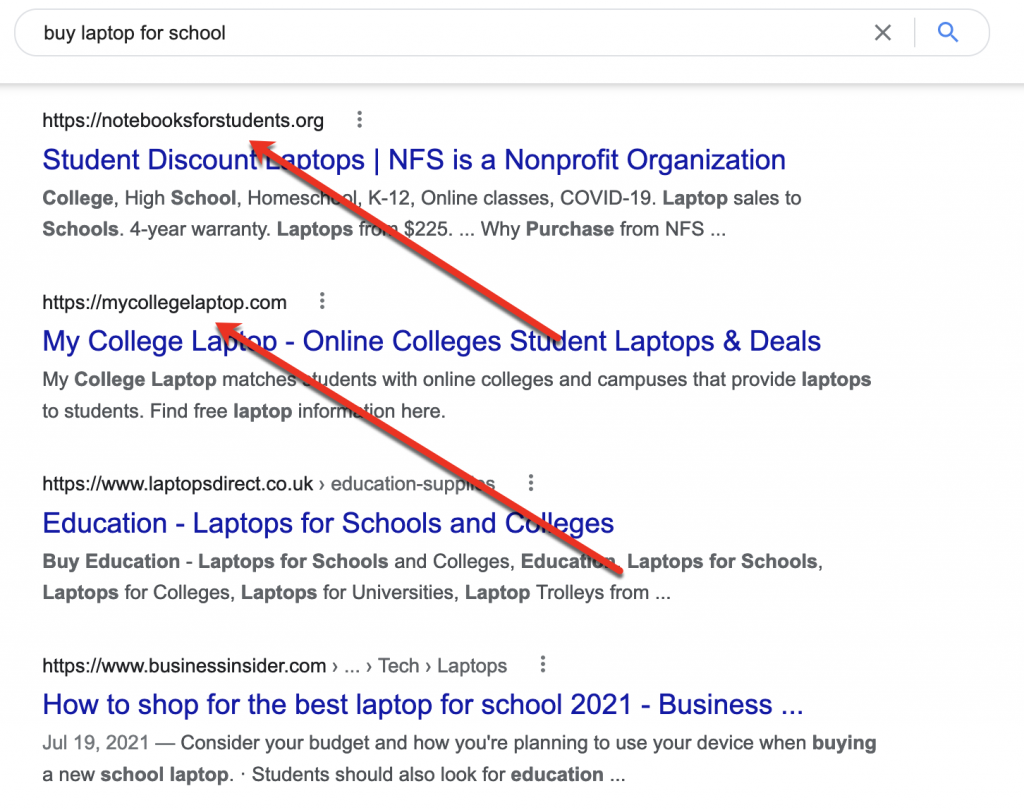
A well-chosen domain that is memorable and eye-catching will help you build your brand recognizability, and that has many marketing benefits (higher click-through, more conversions, etc.) many of which are actual ranking factors.
On the other hand, with an ever-growing list of TLDs, defensive domain registration (i.e. buying different versions of a website’s domain name in order to block competitors from snatching them) can hardly be done now.
So keep in mind that your branding efforts are facing this risk of anyone trying to benefit from your name by registering it on an alternative TLD. While this is not strictly an SEO issue, it is important to keep in mind. As you are investing in your domain name, your brand name becomes a searchable keyword you need to keep an on and optimize for to keep any possible imposters behind.
Conclusion
When choosing a domain name, stop thinking in terms of SEO and focus on how easy it will be to type, remember and associate what it is you are doing. In other words, think branding instead of SEO.
| Myth/Topic | Takeaway |
|---|---|
| Domain names as a ranking factor | Domain names are no longer a direct ranking factor, but keywords in the domain can still generate some link equity with those keywords as anchor text. However, Google is relying less on keywords in the long run. |
| Domain age as a ranking factor | Domain age is not a ranking factor according to Google, despite the persistent myth suggesting otherwise. |
| Domain registration duration as an SEO factor | Registering your domain for multiple years does not impact SEO directly, but Google does consider domain ownership changes as a ranking factor. Buying expired domains may not yield desired results. |
| Domain authority (DA) | Domain authority (DA) is not a factor for Google’s algorithm. It’s a third-party metric and not used by Google. Google assesses backlink signals on a page level, not at the domain level. |
| Top-Level domain (.com) as a ranking factor | Having a .com domain no longer provides a specific SEO advantage. Google also ignores keywords in TLDs (e.g., .seo, .attorney, .events). Local domains may still impact local search results. |
| Importance of domain names | While not a direct SEO factor, choosing a domain name that relates to your niche can increase click-through rates and brand recognizability. Branding efforts are crucial, and defensive domain registration is more challenging with the growing list of TLDs. |
| Conclusion | When selecting a domain name, prioritize branding over SEO considerations. Focus on making it easy to remember, type, and associate with your business or website. |
I am Ann Smarty, owner of SEOsmarty.com. I’ve been in the SEO industry for two decades. I am the former Editor-in-Chief of Search Engine Journal and a contributor to Mashable. These days I am running Viral Content Bee and writing for Moz, Buzzsumo, Wix and many others!
SEO
Google Rolls Out New ‘Web’ Filter For Search Results
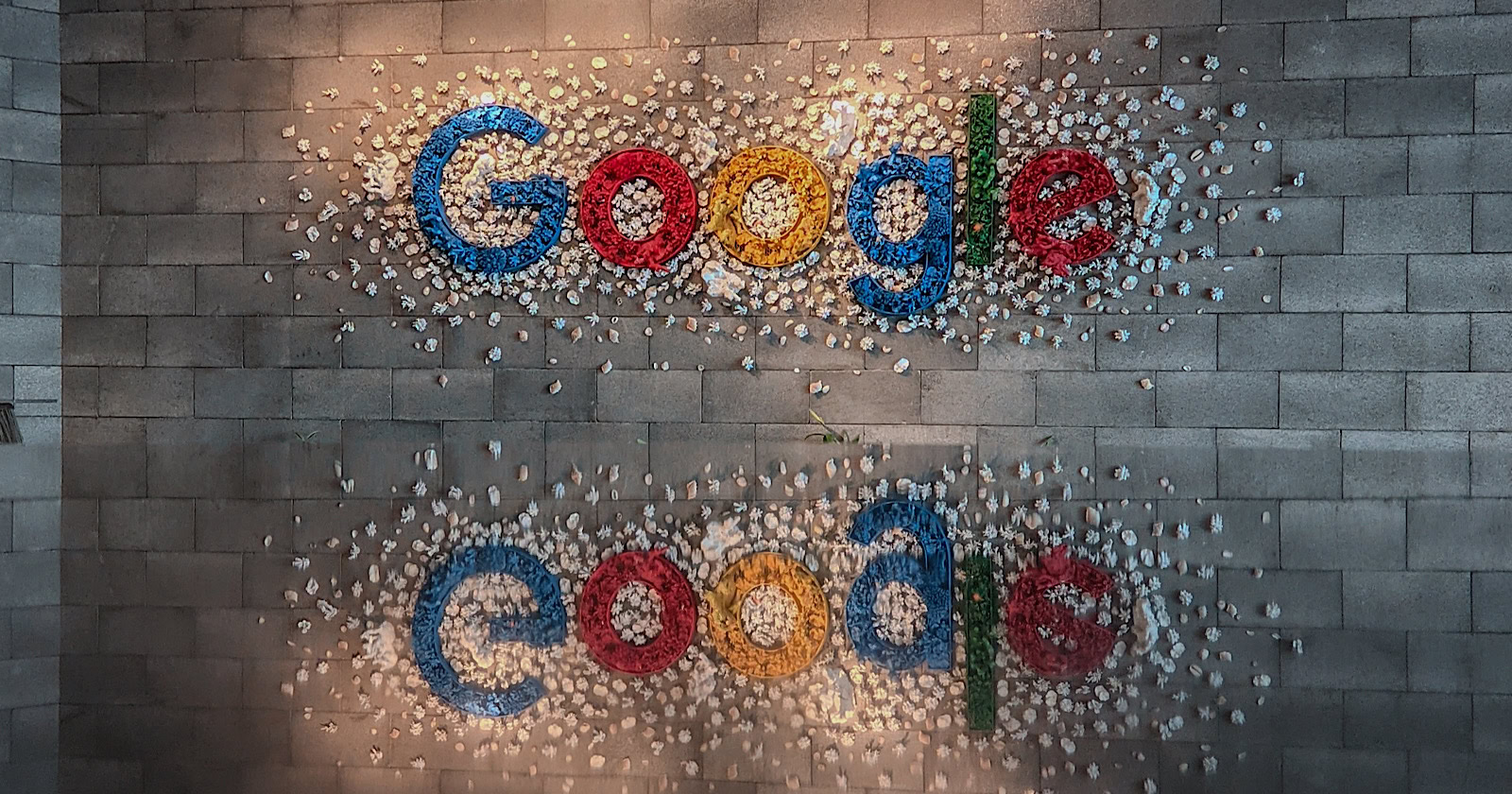
Google is introducing a filter that allows you to view only text-based webpages in search results.
The “Web” filter, rolling out globally over the next two days, addresses demand from searchers who prefer a stripped-down, simplified view of search results.
Danny Sullivan, Google’s Search Liaison, states in an announcement:
“We’ve added this after hearing from some that there are times when they’d prefer to just see links to web pages in their search results, such as if they’re looking for longer-form text documents, using a device with limited internet access, or those who just prefer text-based results shown separately from search features.”
We’ve added this after hearing from some that there are times when they’d prefer to just see links to web pages in their search results, such as if they’re looking for longer-form text documents, using a device with limited internet access, or those who just prefer text-based…
— Google SearchLiaison (@searchliaison) May 14, 2024
The new functionality is a throwback to when search results were more straightforward. Now, they often combine rich media like images, videos, and shopping ads alongside the traditional list of web links.
How It Works
On mobile devices, the “Web” filter will be displayed alongside other filter options like “Images” and “News.”
If Google’s systems don’t automatically surface it based on the search query, desktop users may need to select “More” to access it.
 Screenshot from: twitter.com/GoogleSearchLiaison, May 2024.
Screenshot from: twitter.com/GoogleSearchLiaison, May 2024.More About Google Search Filters
Google’s search filters allow you to narrow results by type. The options displayed are dynamically generated based on your search query and what Google’s systems determine could be most relevant.
The “All Filters” option provides access to filters that are not shown automatically.
Alongside filters, Google also displays “Topics” – suggested related terms that can further refine or expand a user’s original query into new areas of exploration.
For more about Google’s search filters, see its official help page.
Featured Image: egaranugrah/Shutterstock
SEO
Why Google Can’t Tell You About Every Ranking Drop

In a recent Twitter exchange, Google’s Search Liaison, Danny Sullivan, provided insight into how the search engine handles algorithmic spam actions and ranking drops.
The discussion was sparked by a website owner’s complaint about a significant traffic loss and the inability to request a manual review.
Sullivan clarified that a site could be affected by an algorithmic spam action or simply not ranking well due to other factors.
He emphasized that many sites experiencing ranking drops mistakenly attribute it to an algorithmic spam action when that may not be the case.
“I’ve looked at many sites where people have complained about losing rankings and decide they have a algorithmic spam action against them, but they don’t. “
Sullivan’s full statement will help you understand Google’s transparency challenges.
Additionally, he explains why the desire for manual review to override automated rankings may be misguided.
Two different things. A site could have an algorithmic spam action. A site could be not ranking well because other systems that *are not about spam* just don’t see it as helpful.
I’ve looked at many sites where people have complained about losing rankings and decide they have a…
— Google SearchLiaison (@searchliaison) May 13, 2024
Challenges In Transparency & Manual Intervention
Sullivan acknowledged the idea of providing more transparency in Search Console, potentially notifying site owners of algorithmic actions similar to manual actions.
However, he highlighted two key challenges:
- Revealing algorithmic spam indicators could allow bad actors to game the system.
- Algorithmic actions are not site-specific and cannot be manually lifted.
Sullivan expressed sympathy for the frustration of not knowing the cause of a traffic drop and the inability to communicate with someone about it.
However, he cautioned against the desire for a manual intervention to override the automated systems’ rankings.
Sullivan states:
“…you don’t really want to think “Oh, I just wish I had a manual action, that would be so much easier.” You really don’t want your individual site coming the attention of our spam analysts. First, it’s not like manual actions are somehow instantly processed. Second, it’s just something we know about a site going forward, especially if it says it has change but hasn’t really.”
Determining Content Helpfulness & Reliability
Moving beyond spam, Sullivan discussed various systems that assess the helpfulness, usefulness, and reliability of individual content and sites.
He acknowledged that these systems are imperfect and some high-quality sites may not be recognized as well as they should be.
“Some of them ranking really well. But they’ve moved down a bit in small positions enough that the traffic drop is notable. They assume they have fundamental issues but don’t, really — which is why we added a whole section about this to our debugging traffic drops page.”
Sullivan revealed ongoing discussions about providing more indicators in Search Console to help creators understand their content’s performance.
“Another thing I’ve been discussing, and I’m not alone in this, is could we do more in Search Console to show some of these indicators. This is all challenging similar to all the stuff I said about spam, about how not wanting to let the systems get gamed, and also how there’s then no button we would push that’s like “actually more useful than our automated systems think — rank it better!” But maybe there’s a way we can find to share more, in a way that helps everyone and coupled with better guidance, would help creators.”
Advocacy For Small Publishers & Positive Progress
In response to a suggestion from Brandon Saltalamacchia, founder of RetroDodo, about manually reviewing “good” sites and providing guidance, Sullivan shared his thoughts on potential solutions.
He mentioned exploring ideas such as self-declaration through structured data for small publishers and learning from that information to make positive changes.
“I have some thoughts I’ve been exploring and proposing on what we might do with small publishers and self-declaring with structured data and how we might learn from that and use that in various ways. Which is getting way ahead of myself and the usual no promises but yes, I think and hope for ways to move ahead more positively.”
Sullivan said he can’t make promises or implement changes overnight, but he expressed hope for finding ways to move forward positively.
Featured Image: Tero Vesalainen/Shutterstock
SEO
56 Google Search Statistics to Bookmark for 2024
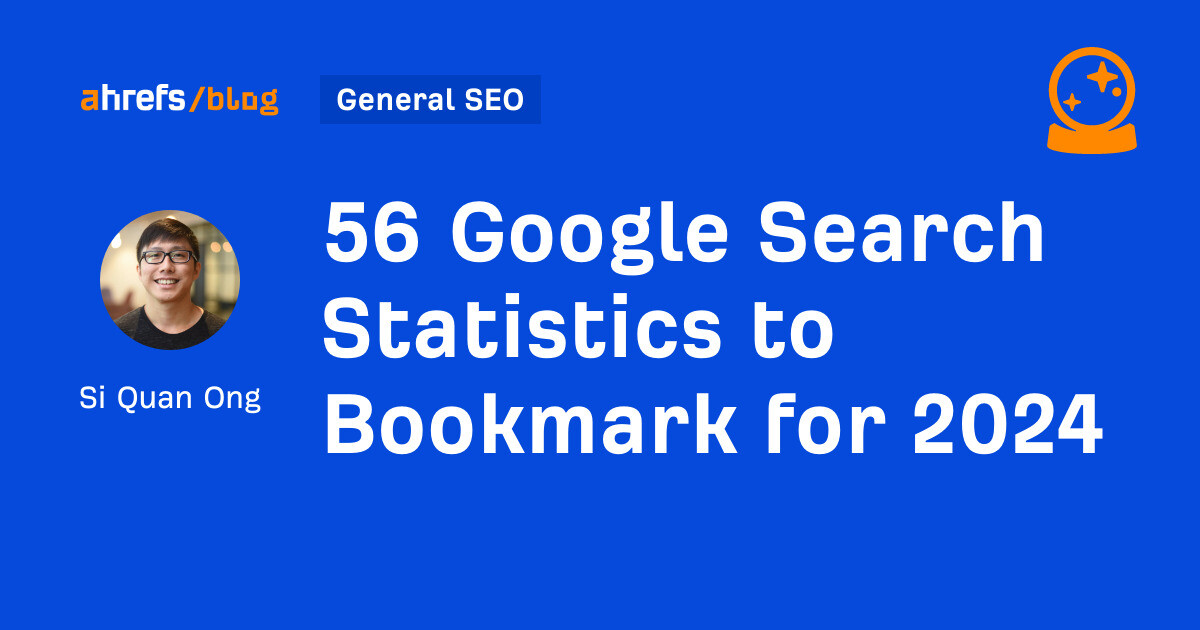
If you’re curious about the state of Google search in 2024, look no further.
Each year we pick, vet, and categorize a list of up-to-date statistics to give you insights from trusted sources on Google search trends.
- Google has a web index of “about 400 billion documents”. (The Capitol Forum)
- Google’s search index is over 100 million gigabytes in size. (Google)
- There are an estimated 3.5 billion searches on Google each day. (Internet Live Stats)
- 61.5% of desktop searches and 34.4% of mobile searches result in no clicks. (SparkToro)
- 15% of all Google searches have never been searched before. (Google)
- 94.74% of keywords get 10 monthly searches or fewer. (Ahrefs)
- The most searched keyword in the US and globally is “YouTube,” and youtube.com gets the most traffic from Google. (Ahrefs)
- 96.55% of all pages get zero search traffic from Google. (Ahrefs)
- 50-65% of all number-one spots are dominated by featured snippets. (Authority Hacker)
- Reddit is the most popular domain for product review queries. (Detailed)
- Google is the most used search engine in the world, with a mobile market share of 95.32% and a desktop market share of 81.95%. (Statista)
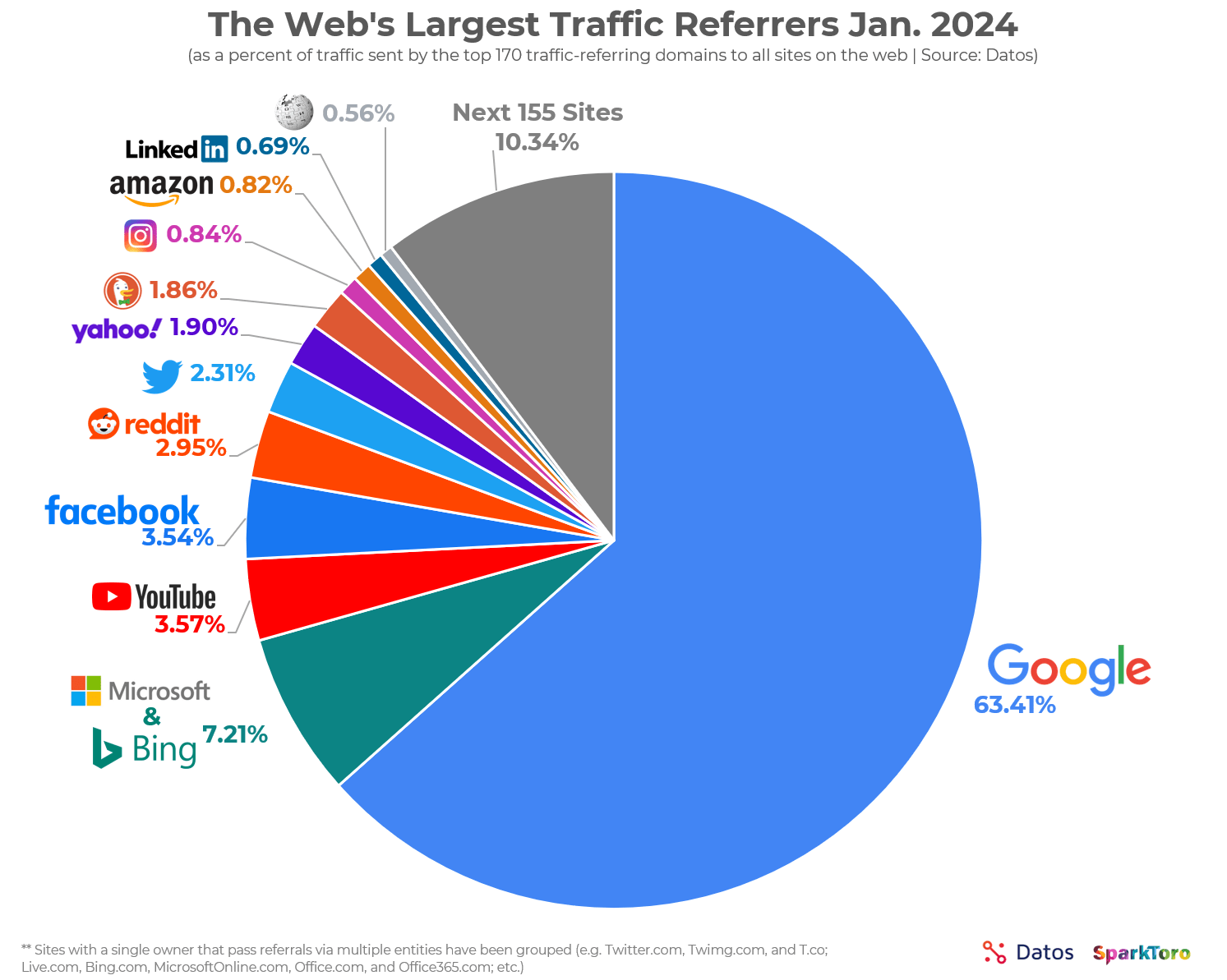

- Google.com generated 84.2 billion visits a month in 2023. (Statista)
- Google generated $307.4 billion in revenue in 2023. (Alphabet Investor Relations)
- 63.41% of all US web traffic referrals come from Google. (SparkToro)
- 92.96% of global traffic comes from Google Search, Google Images, and Google Maps. (SparkToro)
- Only 49% of Gen Z women use Google as their search engine. The rest use TikTok. (Search Engine Land)
- 58.67% of all website traffic worldwide comes from mobile phones. (Statista)
- 57% of local search queries are submitted using a mobile device or tablet. (ReviewTrackers)
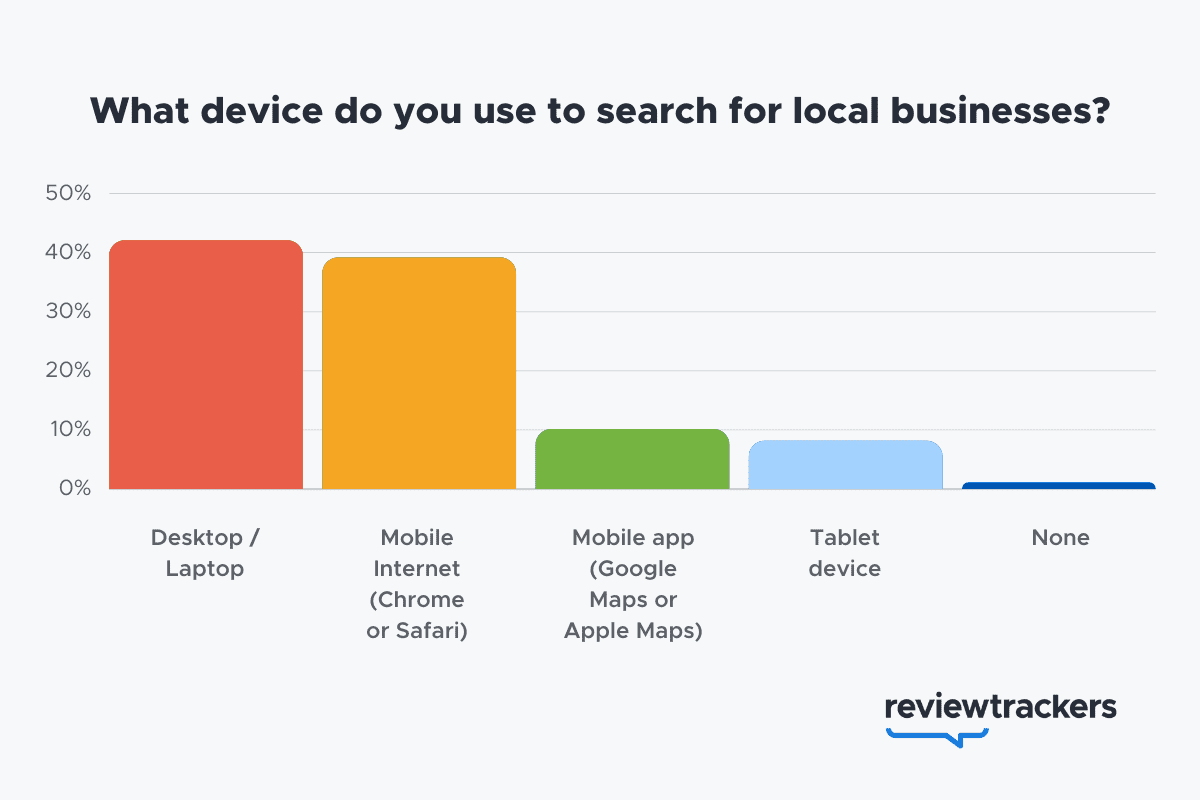

- 51% of smartphone users have discovered a new company or product when conducting a search on their smartphones. (Think With Google)
- 54% of smartphone users search for business hours, and 53% search for directions to local stores. (Think With Google)
- 18% of local searches on smartphones lead to a purchase within a day vs. 7% of non-local searches. (Think With Google)
- 56% of in-store shoppers used their smartphones to shop or research items while they were in-store. (Think With Google)
- 60% of smartphone users have contacted a business directly using the search results (e.g., “click to call” option). (Think With Google)
- 63.6% of consumers say they are likely to check reviews on Google before visiting a business location. (ReviewTrackers)
- 88% of consumers would use a business that replies to all of its reviews. (BrightLocal)
- Customers are 2.7 times more likely to consider a business reputable if they find a complete Business Profile on Google Search and Maps. (Google)
- Customers are 70% more likely to visit and 50% more likely to consider purchasing from businesses with a complete Business Profile. (Google)
- 76% of people who search on their smartphones for something nearby visit a business within a day. (Think With Google)
- 28% of searches for something nearby result in a purchase. (Think With Google)
- Mobile searches for “store open near me” (such as, “grocery store open near me” have grown by over 250% in the last two years. (Think With Google)
- People use Google Lens for 12 billion visual searches a month. (Google)
- 50% of online shoppers say images helped them decide what to buy. (Think With Google)
- There are an estimated 136 billion indexed images on Google Image Search. (Photutorial)
- 15.8% of Google SERPs show images. (Moz)
- People click on 3D images almost 50% more than static ones. (Google)
- More than 800 million people use Google Discover monthly to stay updated on their interests. (Google)
- 46% of Google Discover URLs are news sites, 44% e-commerce, 7% entertainment, and 2% travel. (Search Engine Journal)
- Even though news sites accounted for under 50% of Google Discover URLs, they received 99% of Discover clicks. (Search Engine Journal)
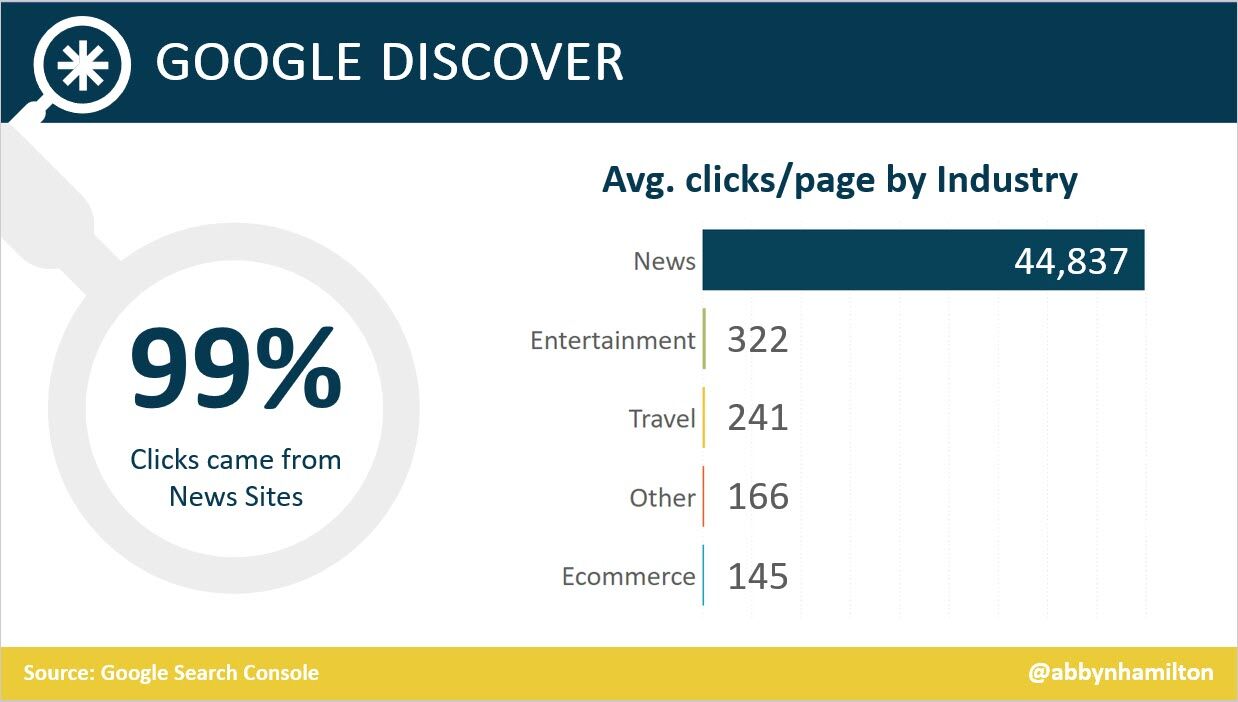

- Most Google Discover URLs only receive traffic for three to four days, with most of that traffic occurring one to two days after publishing. (Search Engine Journal)
- The clickthrough rate (CTR) for Google Discover is 11%. (Search Engine Journal)
- 91.45% of search volumes in Google Ads Keyword Planner are overestimates. (Ahrefs)
- For every $1 a business spends on Google Ads, they receive $8 in profit through Google Search and Ads. (Google)
- Google removed 5.5 billion ads, suspended 12.7 million advertiser accounts, restricted over 6.9 billion ads, and restricted ads from showing up on 2.1 billion publisher pages in 2023. (Google)
- The average shopping click-through rate (CTR) across all industries is 0.86% for Google Ads. (Wordstream)
- The average shopping cost per click (CPC) across all industries is $0.66 for Google Ads. (Wordstream)
- The average shopping conversion rate (CVR) across all industries is 1.91% for Google Ads. (Wordstream)
- 58% of consumers ages 25-34 use voice search daily. (UpCity)
- 16% of people use voice search for local “near me” searches. (UpCity)
- 67% of consumers say they’re very likely to use voice search when seeking information. (UpCity)
- Active users of the Google Assistant grew 4X over the past year, as of 2019. (Think With Google)
- Google Assistant hit 1 billion app installs. (Android Police)
- AI-generated answers from SGE were available for 91% of entertainment queries but only 17% of healthcare queries. (Statista)
- The AI-generated answers in Google’s Search Generative Experience (SGE) do not match any links from the top 10 Google organic search results 93.8% of the time. (Search Engine Journal)
- Google displays a Search Generative element for 86.8% of all search queries. (Authoritas)
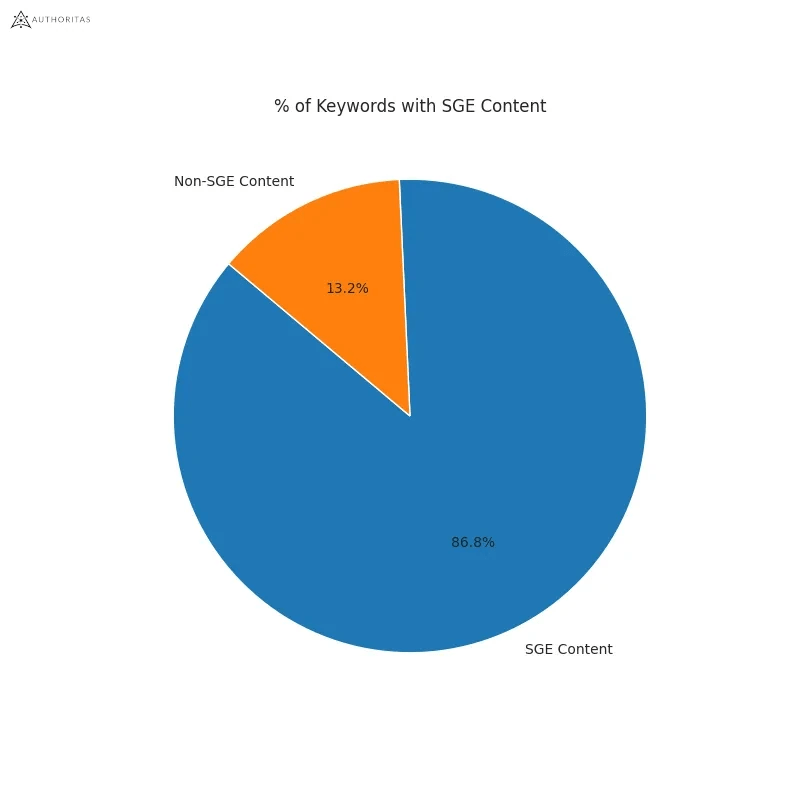

- 62% of generative links came from sources outside the top 10 ranking organic domains. Only 20.1% of generative URLs directly match an organic URL ranking on page one. (Authoritas)
- 70% of SEOs said that they were worried about the impact of SGE on organic search (Aira)
Learn more
Check out more resources on how Google works:
-

 PPC7 days ago
PPC7 days agoHow the TikTok Algorithm Works in 2024 (+9 Ways to Go Viral)
-

 SEO6 days ago
SEO6 days agoHow to Use Keywords for SEO: The Complete Beginner’s Guide
-

 MARKETING6 days ago
MARKETING6 days agoHow To Protect Your People and Brand
-

 MARKETING4 days ago
MARKETING4 days agoAdvertising on Hulu: Ad Formats, Examples & Tips
-

 MARKETING5 days ago
MARKETING5 days agoUpdates to data build service for better developer experiences
-

 MARKETING1 day ago
MARKETING1 day ago18 Events and Conferences for Black Entrepreneurs in 2024
-

 MARKETING6 days ago
MARKETING6 days agoThe Ultimate Guide to Email Marketing
-

 SEO7 days ago
SEO7 days agoAutomate Multi-Site Reporting With Google Sheets And GSC API


